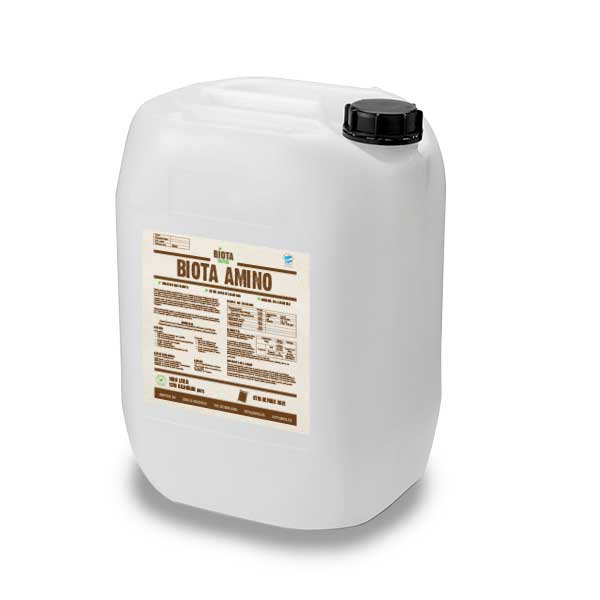
Biota Amino
Biota Amino is a liquid organic fertilizer that stimulates the growth and development of the green parts of the plant during harsh conditions. The aim of Biota Amino is to stimulate the vigor of the plant growth and thus the quality and quantity of production.
Due to the natural origin it contains a high concentration of nitrogen, amino acid and organic matter. It also contains bio stimulants such as polysaccharides, betaines, proteins, enzymes, auxines and vitamins. The use of Biota Amino has a positive effect on both the plant quality and the soil structure and is suitable for foliar application and irrigation.
The plant quality is improved by the high concentration of free L-amino acids. Amino acids and polysaccharides improve the structural development of the crop and its spare energy capacity. The aminogram has been developed to stimulate cell division, metabolic and enzymatic activity and resistance against stress conditions. This stress can be caused by weather conditions, damage or phenological phases.
The organic matter and fulvic acids contribute to a better soil structure. This allows the soil to become more aerated, hold moisture more effectively, have a higher cation exchange capacity, and require less fertilizer.
Biota Amino is fully made from plant-based materials and approved for use in European organic agri- and horticulture. The ingredients are partly sourced from agricultural waste. Due to the natural origin the nutrient content may vary.
Composition
| % w/w | |
|---|---|
| Total nitrogen (N) | 8.4% |
| Organic nitrogen | 4.1% |
| N-NH4 | 4.0% |
| Organic matter | 60% |
| Total organic carbon | 30% |
| Humus extract | 23% |
| Free amino acids | 13% |
| Poly-saccharides | 6.2% |
Properties
| Colour | Dark brown |
|---|---|
| pH | 5.5 – 7.5 |
| Density (kg/l) | 1.26 – 1.28 |
Packaging
| Amount (litre) | |
|---|---|
| Bottle | 0.25, 0.5, 1 |
| Can | 10, 20 |
| Drum | 220 |
| IBC | 1000 |
Storage
Store in a dark and dry location at 10 – 25 °C.
Shelf life 1.5 – 2 years.
- In the plant:
- Higher productivity and crop quality
- Improved plant growth
- Increases resistance against stress conditions
- Larger fruits of higher quality
- Better root system
- Higher cellular division
- Better metabolic and enzymatic activity
- In the soil:
- Improves soil structure
- Improves soil aeration
- Better nutrient absorption
- Better moisture retention
- Lower consumption of other fertilizers
It is advised to always have an expert make a fertilization plan and to start with a test application. No guarantees can be given in the event of incorrect use. Best results are obtained through irrigation, Biota Amino can always be applied, except during blooming or in the event of a fungal infection.
| APPLICATION | DOSE | DOSAGE | |
| FOLIAR APPLICATION | 2 -3 ml/liter | ||
| IRRIGATION | DRIP | 5 – 10 liter/ha | Every 7-15 days |
| TARGETED TREATMENT | 20 liter/ha | During high stress conditions | |
| CROP | APPLICATION |
| Corn | Every 7-10 days from budding until blooming. Use when nitrogen fertilization is required. |
| Cotton | Every 15 days from budding until blooming. Use when needed for crop stimulation (stress). |
| Citrus and fruit trees | 4 applications: 2 at budding and 2 during budburst. |
| Vegetables and cut flowers | 4 – 6 applications from the start of the crop, dependent on stress and development. |
| Grapevine and olive | Use before bloom and when needed for crop stimulation (stress). |
Due to differences in regional regulations, please contact us for the documents that are specific to your location.
FiBL Amino
Demeter Germany
Demeter International
Ecovin Germany
FiBL Inputs list for the organic agriculture in Germany, resp. FiBL Inputs list for organic processing
Gäa Germany
Naturland Germany
Reg. (EC) 834/2007
Control Union EU Inputs
Control Union Certifications Standards on Inputs (based on EEC 834/2007 and 889/2008)
Control Union NOP Inputs
Control Union Certifications Standards based on the National Organic Program of the US Department of Agriculture
Alanine
Aspartic acid
Cysteine
Phenylalanine
Glutamic acid
Glycine
Histidine
Isoleucine
Leucine
Lysine
Serine
Threonine
Tyrosine
Valine






